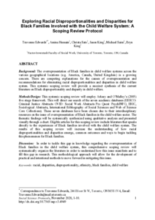ABSTRACT
Background: The overrepresentation of Black families in child welfare systems across the various geographical locations (e.g. America, Canada, United Kingdom) is a growing concern. There are competing explanations for the causes of overrepresentation and recommendations for eliminating racial disproportionalities and disparities in child welfare system. This systemic scoping review will provide a succinct synthesis of the current literature on Black disproportionality and disparity in child welfare.
Methods/Design: This systemic scoping review will employ Arksey and O’Malley’s (2005) five stage framework. This will direct our search of the seven academic databases (EBSCO: Criminal Justice Abstracts OVID: Social Work Abstracts Pro Quest: PsychINFO, ERIC, Sociological Abstracts, International Bibliography of Social Sciences and Web of Science Core Collections). These seven databases have been chosen due to their interdisciplinary resources on the issue of overrepresentation of Black families in the child welfare sector. The thematic findings will be systemically synthesized using qualitative analysis and presented visually through a chart. Eligible articles for this scoping review include literature that speaks directly to the experiences of Black families involved with the child welfare system. The results of this scoping review will increase the understanding of how racial disproportionalities and disparities emerge, common outcomes and ways to begin tackling this phenomenon for Black families.
Discussion: In order to tackle this gap in knowledge regarding the overrepresentation of Black families in the child welfare system, this comprehensive scoping review will systematically organize the literature in order to understand how this issue manifests and to fill this gap in research. This methodological approach will allow for the development of practical and intentional methods to move forward in mitigating this issue.

